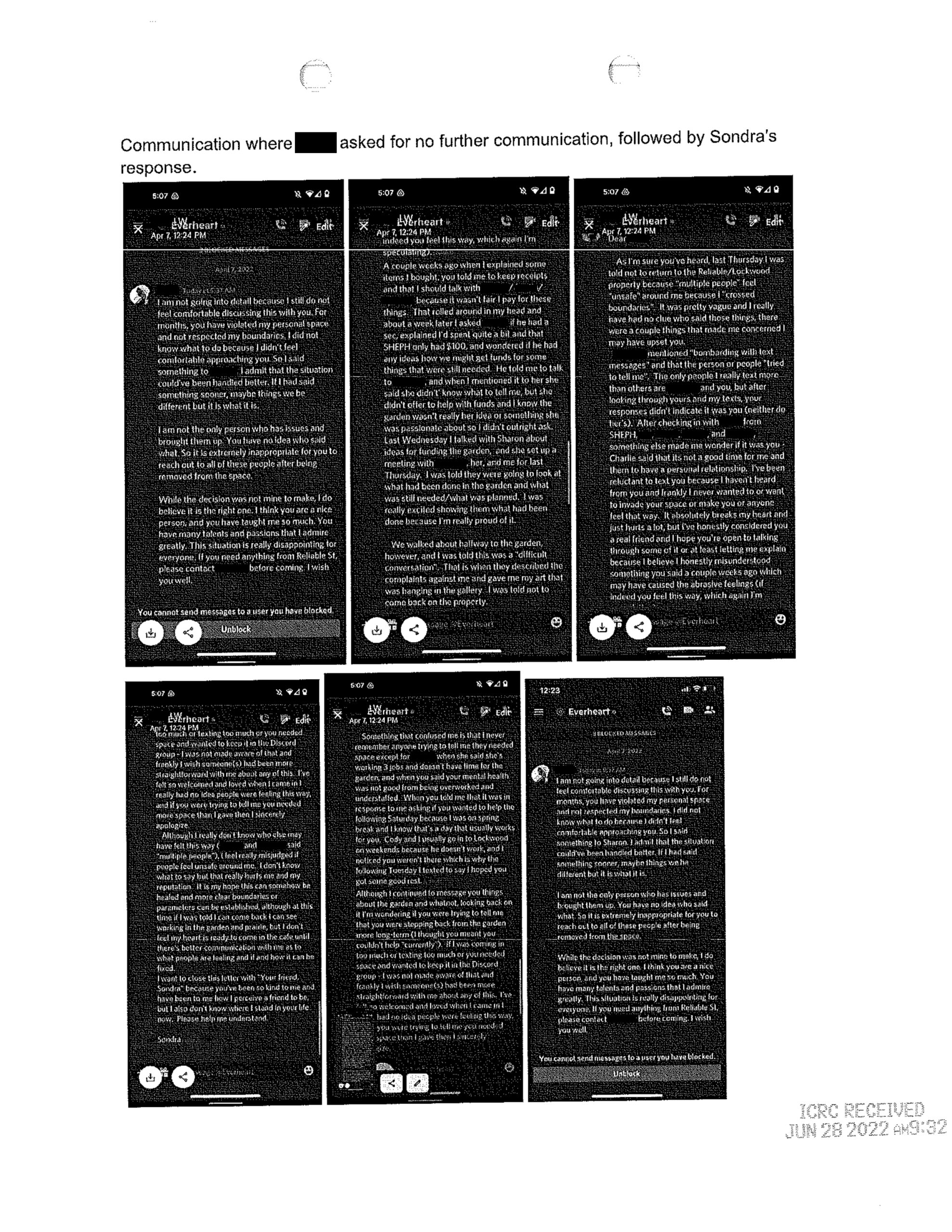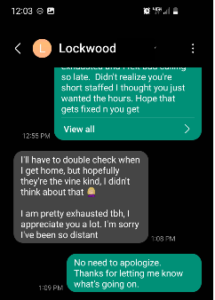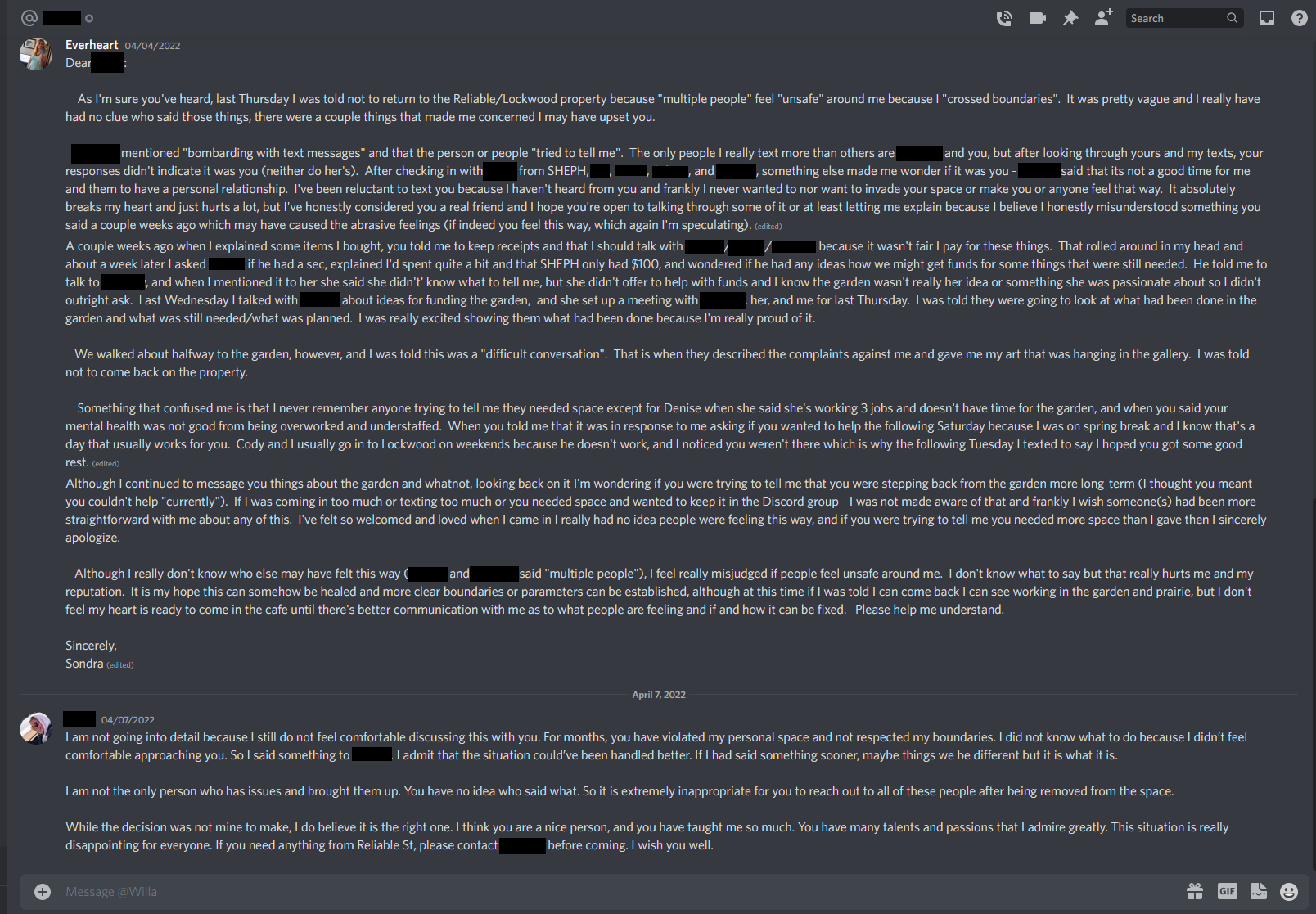Sondra Wilson sues Lockwood Café and Reliable Street, alleges defamation, discrimination, and fraud (2024)
by Sondra Wilson. [email protected]. Originally posted 11/9/2022. Last updated 3/19/2024
I filed the lawsuit on December 5, 2023. You can read the petition I filed, the motions defendants filed on Feb. 29, 2024, and the response motion I filed within the following timeline. I have included enough evidence below to show exactly what happened and that I was in fact very wronged, and why it is a serious enough matter that I am suing. Names are redacted at this time.
Dec. 5, 2023 – I filed this Petition to commence a lawsuit against Reliable Street Inc., Lockwood Café, and five individuals who work/ed at and/or were associated with these organizations. Case number: LACL157381 (Polk County).
Feb. 9, 2024 – Story County Sheriff’s Deputy served Original Notice (summons) to Defendants at Reliable Street and Lockwood Café, which share the same address.
Feb. 29, 2024 – Defendants filed two motions:
- redacted Defendants’ Motion to Quash or Joinder – all five Defendants besides Reliable Street and the President of Reliable Street filed this motion, reqeusting the case dismissed, stating that they were improperly served. As an alternative (if their motion is denied), they moved to join the following motion filed by Reliable Street and the President’s attorney on their behalf:
- redacted Defendants’ lengthy Motion to Dismiss – Defendants request numerous times within this motion to have the case dismissed. Also requested to have the case transferred to Story County instead of Polk. Again within the motion I was painted as a predator; the evidence, however, will expose that this group of friends did. That is why they keep trying to get the case dismissed (instead of simply apologizing and trying to make things right).
Mar. 15 – I filed this motion:
- for Judge Gronewald to recuse herself because she was appointed by anti-transgender Governor Kim Reynolds;
- to continue this lawsuit after I return from studying abroad in London, around May 2;
- to deny Defendants’ repeated attempts to convince Judge Gronewald to dismiss the case based on minute technicalities;
- to allow time for me to amend my petition and serve process to Defendants via publication due to the fact that I do not know their mailing addresses.
Key events which led to the lawsuit:
October 2021 – March 2022 – Volunteered for Reliable Street Inc, a non-profit organization in Ames, Iowa for approximately 20 hours/week for 5 months. Entered into multiple agreements with Reliable Street’s President, including helping to restore and manage their community garden, and install native tallgrass prairie.
View documentation of my volunteerism.
March 31, 2022 – I was suddenly barred from the property by the President and Vice President of Reliable Street due to what I would find out later were slanderous complaints against me. I was not informed about the nature of the complaints, was kicked off the property with a vague explanation which didn’t add up, in violation of our agreements and without being compensated for my labor. I would not have performed months of labor had I known I was going to be treated like this.
Why the allegations are so harmful to me – I documented my gardening and prairie restoration work in order to build a portfolio to find work in the future, but instead I left the property with my reputation badly damaged. As a transgender woman, to be kicked off the property due to allegations of sexual harassment is a life-ruining experience which severely harms my reputation. As the founder of Wild Willpower and Candidate for Iowa Governor in 2026, the allegations against me could easily be used as political attacks in order to harm me and the causes I believe in. My entire life’s work – my books – everything I worked for my entire life had been attacked.
April 1 – 6, 2022 – After I was barred from the property, I wrote letters to my friends from the space to inform them:
- They would no longer see me at Reliable Street or Lockwood Café.
- that I was not told the nature of the complaints, but it sounded like I was accused of something “very bad” along the lines of sexual harassment.
- That I really didn’t know what this was about, and if they heard something, to please talk to me about it
I also called multiple attorneys and performed online research to learn what to do when falsely accused of sexual harassment. Based on my testimony, multiple attorneys and the Better Business Bureau urged me to file a complaint with the Iowa Civil Rights Commission because they investigate discrimination claims. I actually had not considered that this may have been a case of discrimination until after I heard this feedback. After reflecting on it, I now firmly believe Reliable Street’s President and Vice President discriminated against me, which I wrote about here:
A detailed explanation why I believe I was discriminated against.
April 2022 – filed this complaint with the Iowa Civil Rights Commission (“Commission”) against Reliable Street Inc., Lockwood Café, and Love Club LLC (owner of the property).
Aug. 3, 2022 – After I filed the complaint against the businesses, it appears the group of employees and owners banded together in order to the back the story against me via submitting several false statements to the Commission. I received notice from the Commission they were not going to investigate the case. The Commission’s analysis of the evidence indicated that the President of Reliable Street and a local artist and friend of the people involved (“Artist”) submitted approximately ten extremely damaging defamatory statements about me, including but not limited to allegations of “harassing Lockwood Café employees”, “stalking an employee”, and “saying racist comments”. The Artist happens to be transgender as well, which complicates matters. I believe this person wrote the damaging statement about me in order to protect their friends and the businesses. Although the Artist told the Commission they were merely “a customer of Lockwood Cafe”, they withheld the fact that they have had multiple art shows in Reliable Street’s Art Gallery, and are (or were) close friends with the employees who slandered me.
Sept. 3, 2022 – appealed the Commission’s decision, requesting them to re-open and investigate the case. Provided evidence which strongly indicated at least some Defendants had lied.
Sept. 27, 2022 – Commission denied my appeal. Informed me I had up to two years to request a “letter-of-right-to-sue”, and that, after I request the letter, I would have 90 days to file the lawsuit. I was also informed by the Commission that my complaint was dual-filed with the Equal Employment Opportunity Commission (“EEOC”), and that I had 15 days to request them to investigate the case for evidence of discrimination.
Sept 30, 2022 – requested a copy of the Commission’s file in order to review which individuals made libelous statements against me, and exactly what was said. These facts were impossible to determine from the Commission’s determination letter, which only included their assessment of the evidence. Their assessment contained hearsay statements, such as “Owner of Lockwood Café stated that Employee #1 said X”. As a result, I did not know if the owner had lied to protect the business, or if the employee had actually said the statement. The Commission’s employee informed me that I could not obtain a copy of the file until I requested a letter-of-right-to-sue, at which point the 90 day time limit to file my case would commence.
Oct. 2022 – requested the EEOC to review my case.
Jan. 23, 2023 – informed by the EEOC that they were choosing to adopt the findings of the Commission, and would not be further investigating my case.
Sept. 8, 2023 – requested letter-of-right-to-sue from the Commission, then immediately requested a copy of the case file so I could finally review the evidence.
Oct. 23 – 30 days after requesting it, the Commission sent me the file, leaving me only 60 days to sort the evidence and file the lawsuit. For the first time I was now able to see the names of the small clique of friends who slandered me, and whose libelous statements against me were sent to the Commission. I also witnessed, for the first time, that a fraudulent document was submitted to the Commission against me, which included screenshots from a conversation re-arranged in order to deceive the Commission and convince them to drop the case via making it appear as if I had performed a predatory action when I had not.
***********************
Article:
This article was originally released in 2022 after receiving notice from the Iowa Civil Rights Commission (ICRC) on August 3 that they were administratively closing (choosing not to investigate) my case. More than a year later, on October 11, 2023 ICRC finally sent me the evidence sent to them by Lockwood Café and neighboring non-profit Reliable Street. Had they sent me this evidence at they time they closed the case, I could have proved in my appeal that Lockwood Café Employee #1 lied about me to get me kicked off the property, and that someone (either her or the Owner of Lockwood Café, presumably) created a falsified document (scroll down to view) in order to convince ICRC that their actions against me were justified. Lockwood Employee #1 appears to have worked along with her small clique of friends (including Employee #2) to get me kicked off the property (it was petty high school behavior). Although Employee #2 also lied about me, I have hard evidence regarding Employee #1, so that is where this article focuses.
Irrefutable Evidence of a Fraud Against Me:
After contacting friends from the space, Lockwood Café Employee #1 informed me that she complained about me. She said she felt I was violating her space and that she would have said something, but felt uncomfortable talking with me about it. Text messages between me and her, which are almost exclusively about gardening, prairie restoration, or music, indicated that she was a friend. She never gave nor felt any indication of anything otherwise. Here are some examples of texts from shortly before I was kicked off the property. Her “love you” comment was in response to me sending her the President of Reliable Street’s Venmo information, because she and I each donated $100 toward prairie seeds – I never saw her since these text messages, nor did I know or ask where she lived; it is preposterous that I was somehow accused of “stalking” her within Reliable Street’s filing to the Iowa Civil Rights Commission:
It was April 4, 2022 when I messaged her, as I did with other friends from the space, about what had happened. On April 7 she messaged me that it was she who had complained against me, stating that “had she said something sooner” it may have been handled better. I believe that she accused me of “violating her space”, however what really happened is that she “felt uncomfortable” around me, and instead conveyed it in an accusatory way. We have a long chain of text messages from the months I worked there, and anyone who has read them agreed I was never given indication regarding her unexpressed feelings. I believe I was wrongly punished by Reliable Street, and that there was a presumption of guilt against me because “a non-transgender woman accused a transgender woman of violating her”. Due to typical stereotypes and prejudice against transgender women, largely exacerbated by our current political climate, I was treated as a threat, and she the victim, without any investigation or opportunity to hear the allegations against me.
It was not until October 11, 2023 that the Iowa Civil Rights Commission finally sent me copies of the documents sent to them by Reliable Street and Lockwood Café. It was at this time that I learned that the letter I sent to Lockwood Café Employee #1, followed by her response, were tampered with in order to trick the Commission into believing I harassed her. Here is a redacted copy of the letter I sent to her, followed by the tampered document Lockwood Cafe’s owner sent to the Commission:
My letter to her (before I realized I was being gaslighted), and her response:
What Lockwood Cafe’s owner sent to the Commission: 
Iowa Civil Rights Commission aided and abetted the businesses:
The predatorial actions against me were enabled and compounded by the poor process the Iowa Civil Rights Commission has in place, which a volunteer oversight committee also found tilts the scales in favor of businesses, against Citizens. The exact complaints I have against the Iowa Civil Rights Commission’s process are detailed within the lawsuit I filed against the State of Iowa and Kim Reynolds for Iowa on 2/8/2024.
A message from Sondra:
Since the time I was discriminated against, I contacted every relevant legal aid organization I could find throughout the state. I was told the same thing by each of them, “We don’t take fee-generating cases. Find a private attorney.” (The University of Iowa, however, told me that the lead Professor was retiring, so their reason appeared different). After contacting more than 50 attorneys/law firms, the least expensive quote I received was “$5000 up front, $275/hr.” This, of course, is far beyond what I can afford. Therefore, I filed this “pro se” – or without an attorney. I have contacted numerous nonprofit organizations and news agencies, and have received no media coverage. It appears to me that – in this political climate – most attorneys and organizations in Iowa are not willing to risk their reputation via suing a local business on behalf of a transgender woman.
It has been a physically and emotionally exhausting marathon researching laws and untangling the 172 civil court procedure rules (Iowa Rules of Civil Procedure and Iowa Rules of Evidence) in order to be able to file this by myself. I have contacted more than 20 news agencies, and have received no media coverage. Had I not founded www.WildWillpower.org, this story would not have reached you. Thus far I am performing my own research, legal work, outreach, and media campaign in order to clear my name from the terrible allegations made against me by the small clique of friends who work at these businesses. As I prove my case, I would like to see the employees fired, and I would like an apology from the businesses. I would like reimbursed for the approximately 6 months of volunteer labor I performed which I would not have performed had I known I was going to be treated like this, and I would like to be reimbursed for the tedious months of labor building this lawsuit and campaign have taken me. I would also like reimbursed for the emotional pain and suffering I have endured. “Emotional pain and suffering” damages are typically awarded in lawsuits such as these.
To the business owners: if you feel you were genuinely misled and deceived by the employees, you may wish to consider filing what is called a “cross-complaint”, wherein you allege fraud by the employees so that you are not held in full liability. To anyone caught in the middle, I do feel compassion for you, and I hope you will prove to me that you value justice, and the friendship that I believe we once had.
To the persons who lied about me: you ought to be ashamed of yourselves. There are people out there who are legitimately harassed and stalked, and desperately seek to find help. I believe it is a sin to create false reports against people, and it does those people with legitimate complaints a great injustice. Furthermore, I know that Lockwood Café and Reliable Street have a wonderful community surrounding them and who invests in them because they believe these are safe spaces and legitimate allies of LGBT+ people, as they convey themselves to be. To create a predatorial act against a transgender woman from behind the scenes, which seriously harms my reputation and jeopardizes my safety is completely unacceptable, and a violation against the community. I do hope that you come forward with the truth and sincerely apologize to myself and the community.
To anyone reading this, this lawsuit has only begun, and I still have a great deal of work to do – not only for this case, but also for the related suit against the State of Iowa and Kim Reynolds for Iowa. There are four ways in which you can help, and I would be very grateful for your doing so:
- Share this article and/or the lawsuit against the State of Iowa and Kim Reynolds for Iowa along with the hashtag #JusticeForSondra.
- Donate toward my legal funds (it is going to require a great deal of time and energy to write motions, perform research, filing fees, etc.
- PayPal = [email protected]
- Venmo = @Sondra-Wilson-777
- or email [email protected] to arrange another method.
- I am seeking journalist(s) and/or media outlets to share my story. Thus far I have had no media coverage.
- Whatever else you can think of to help. Please contact [email protected].
Related Articles:
- “Why 60% of Iowa workers’ civil rights complaints aren’t investigated; why process is so difficult” by F. Amanda Tugade.
- “Iowa should stop tilting the scales in civil rights cases” by Lucas Grundmeier.
The above graphic is reposted from O’Dea High School’s Facebook page, and is being used for First Amendment purposes in accordance with the U.S. Copyright Office’s Fair Use policy.




